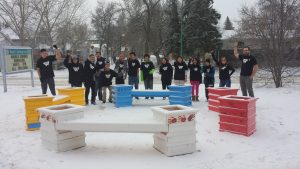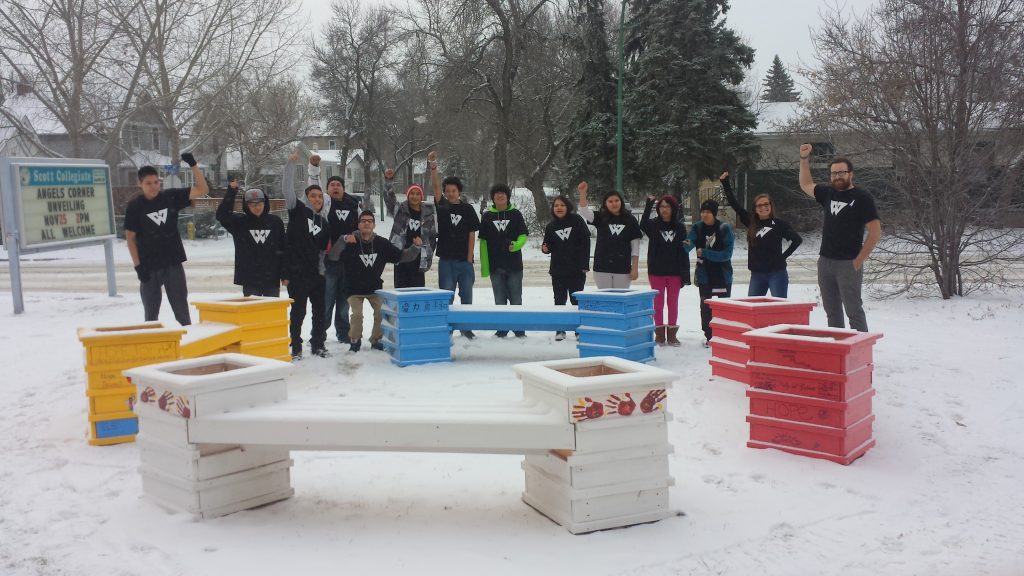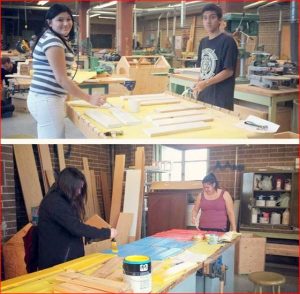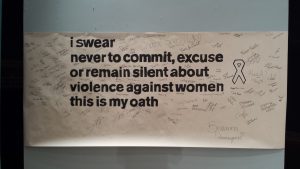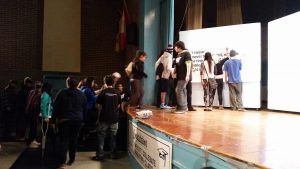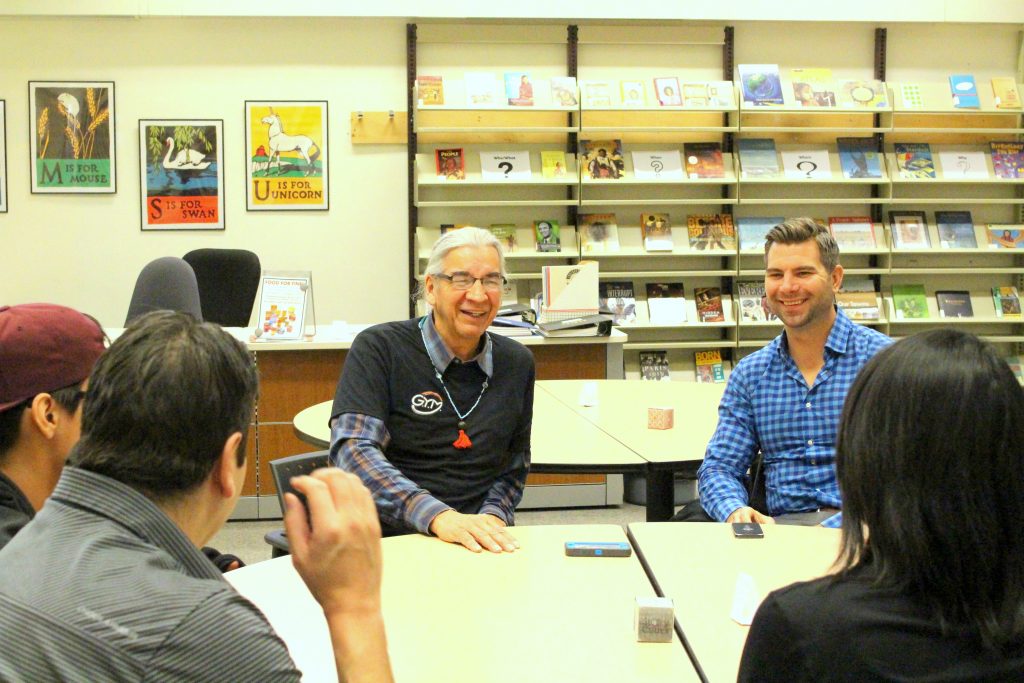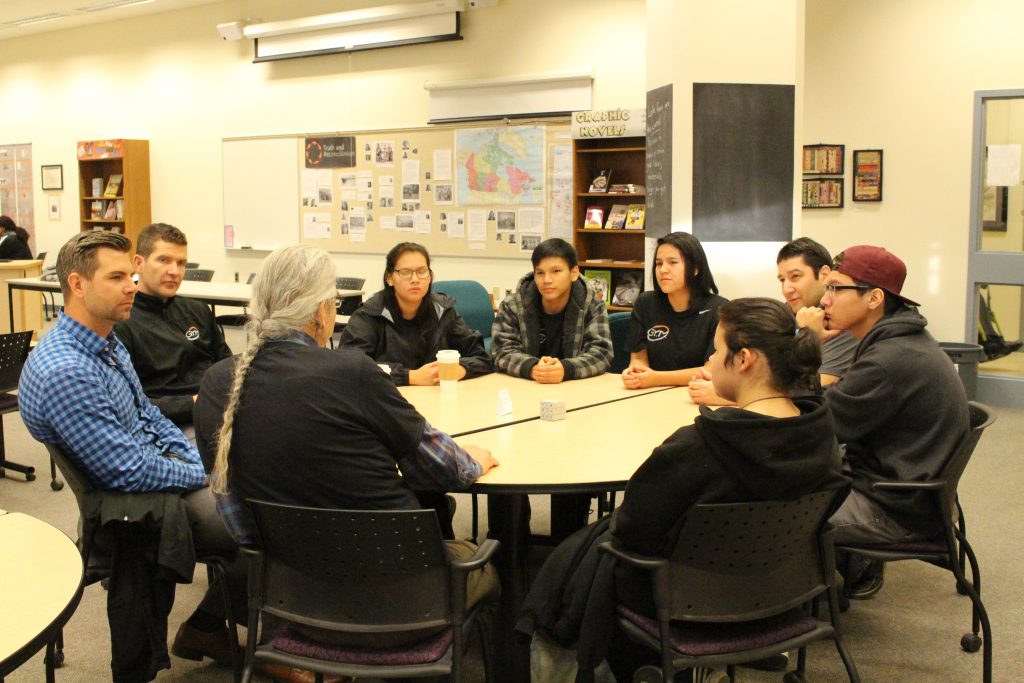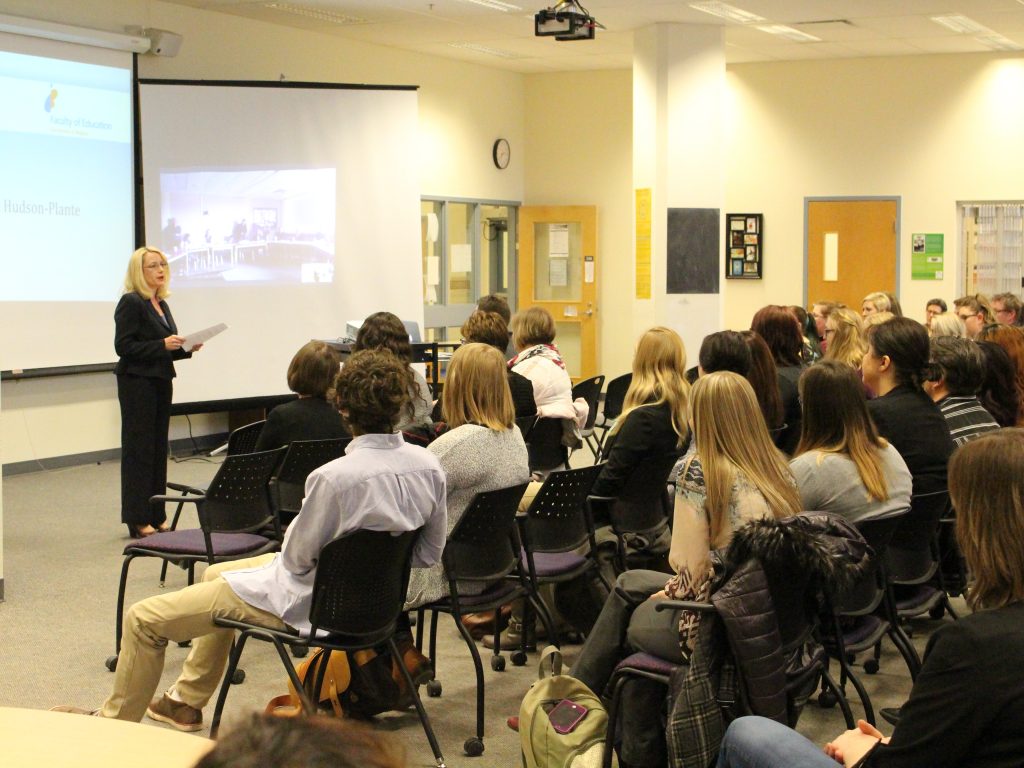
On April 6, the Faculty of Education, SUNTEP and YNTEP gathered to celebrate student success. This year was different than previous years: The coordinators from the Student Program Centre, Dr. Val Mulholland, Nicole Glas, and Wendy Campbell, invited faculty from SUNTEP, YNTEP, and the various Faculty of Education programs and student societies to forward a list of students who have made contributions to learning and to leadership in the Faculty of Education through scholarship, activism, and engagement in coursework. In previous years, academic excellence was the only success that was celebrated. There were 166 students honoured at the celebration and their names were scrolled individually across the screen throughout the event.
Dr. Jennifer Tupper, Dr. Val Mulholland, and Dr. Michael Cappello highlighted and honoured not only the students’ achievements in their classes, but also in their field placements, and in the community.
After welcoming the students and their families, Dr. Val Mulholland said, “You have been recognized by faculty members or program for having made a significant contribution to teaching, learning and/or leadership in the classes, in field placements or beyond classroom walls.”
Dean Jennifer Tupper said, “This celebration is more than recognizing academic excellence, which we value. It is recognition of our students taking seriously their call to teach for a better world, to inspire and transform education – which many of you may know is the motto of this faculty.”
And after listing some of the amazing initiatives with which students have been involved, such as the STARS Regina’s #TreatyEdCamp, and other sessions working towards social justice; the Science Education students’ work with Treaty 4 schools; and the ESS’s PD opportunities, Dean Tupper said, “What I am struck by in my conversations with our teacher candidates is their passion for teaching and learning in the midst of the many challenges schools and teachers are facing. I am struck by their commitment to social justice, and their desire to create meaningful and transformative learning experiences for young people in schools. They are thoughtful, compassionate and courageous.”
Dr. Michael Cappello spoke about the students’ exceptional contributions which are helping to shape the field of education even before entering it as teachers.
Also unique to this celebration was the Skype connection with YNTEP students and faculty who are located in Whitehorse, Yukon. Through this connection, Faculty of Education and SUNTEP members were able to participate in the YNTEP celebration, and YNTEP students participated in the Regina celebration. Dr. Andrew Richardson, Dean of Applied Arts for Yukon College, spoke on behalf of YNTEP, recognizing the following YNTEP students:
Candice Cockney
Judy Leamon
Meghann Meadowcroft
Dwight Snowshoe
The following is the list of Faculty of Education and SUNTEP students celebrated:
Riley Arseneau
Nicki Bannerman
Gareth Bawden
Laura Beatch
Raquel Bellefleur
Mackenzie Bellegarde
Madison Biem
Curtis Bourassa
Orisha Boychuk
Bailey Braden
Jenny Brouwers
Miranda Brown
Miranda Button
Amy Campbell
Aimee Castillo
Matthew Chamberlain
Jennifer Chyz (Hackl)
Joseph Clark
Sarah Clarke
Candice Cockney
Petina Cook
Amanda Corbett
Celine Couture
Rachel Cronan
Kari Davis
Brandon Debert
Jenna DeBoth
Samantha Dech
Arnaud Demaria
Megan Dobson
Allison Doetzel
Jacquelyn Easton
Courtney Einsiedler
Jordan Ethier
Amanda Filipchuk
Chad Fisher
Steven Fraser
Taylor Frei
Lila Gaertner
Sally Generoux
Sheena Gigian
Graham Gilmore
Caitlin Grant
Isabelle Grégoire
Jessie Guraliuck
Christine Hall
Cassandra Hanley
Tara Hanson
Taylor Harder
Kylie Harder
Amanda Harle
Emma Harold
Allyson Haukeness
Madison Hawkes
Chandra Hawley
Laura Heinmiller
Kayla Henderson
Cassandra Hepworth
Jessica Hickie
April Hoffman
Victoria Howe
Hanna Hudson-Plante
Benjamin Ironstand
Rebecca Jalbert
Douglas Jarvis
Jarrod Jobb
Tammy Kadler
Nicole Keller
Christina Kelly
Amy Klassen (Thiessen)
Kristen Klatt
Landen Kleisinger
Amanda Koback
Brooke Korchinski
Shae-Lynn Kowaniuk
Jasmine Kuntz
Riley Lajeunesse
Brittany Larson
Judy-Ann Leamon
Amber Learned Garritty
Keith Lee
Kendra Leier
Matthew Leupold
Gillian Maher
Amy Martin
Daisy Martinez
Roxan McAtee
Aidan McKeague
Linda McNabb
Brigid McNutt
Meghann Meadowcroft
Christopher Merk
Matthew Mickleborough
Jesse Miller
Lexi Milligan
Amy Missal
Cameron Mohan
Renee Molesky
Alexandra Mortensen
Sarah Munro
Monica Nawakayas
Robert Neufeld
Cole Nicolson
Crystal Norris
Haleigh Oberkirsch
Emma Olson
Brooklyn Orban
Lexy Osborne
Fred O’Soup
Eriko Parker
Megan Pearce
Emily Perreault
Josie Phillips
Jaylyn Pierce
Alexis Poh
Marissa Poitras
Kendell Porter
Jessica Pouliot
Breanne Prazma
Mackenzie Raedeke
Amie Reid
Holly Robinson
Brooke Robson
Sarah Rohde
Kaitlyn Rohrke
Jolene Ross
Aidan Roy
Avery Saunders
Michael Schienbein
Garrick Schmidt
Rina Schmidt
Jason Shamel
Nissa Shiell
Bradley Slepicka
Charis Slusar
Tracy Smotra
Dwight Snowshoe
Shania Sonen
Connie Starblanket
Jacob Stebner
Kelsie Sutherland
Jessica Swartz
Zakk Taylor
Christina Thiel
Bryn Todd
Catlyn Todorovich
Caitlin Toews
Jayda Van Betuw
Dacy Vance
Willow Wallace-Lewis
Trisha Wallington
Robert Webb
Katlyn Weisberg
Raelyn Weisgerber
Crystal Whitehawk
William Whitten
Cameron Wiest
Dana Wilbraham
Benjamin Woolhead
Conor Woolley
Aysha Yaqoob
Cassidy Zacharias
Ziyao Zhu
Michael Zylak
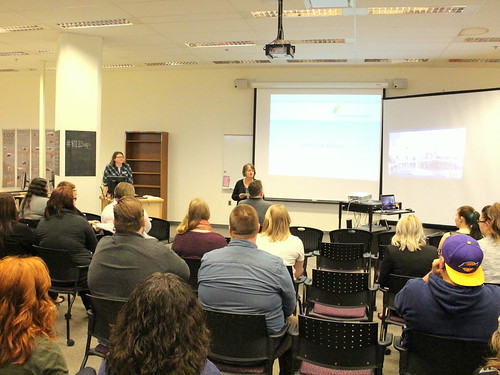
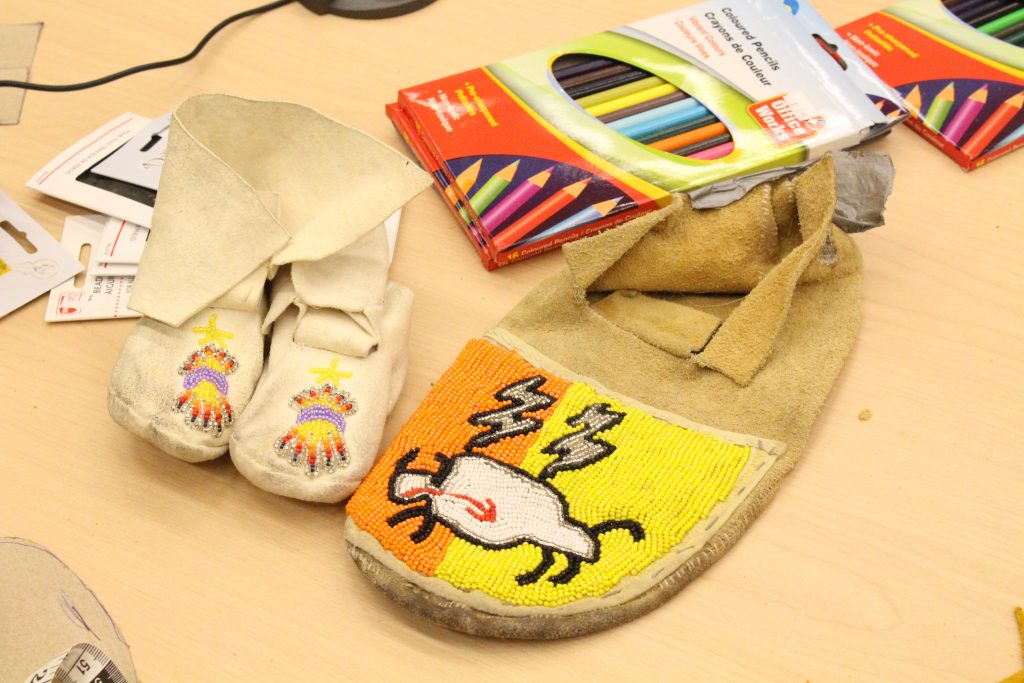
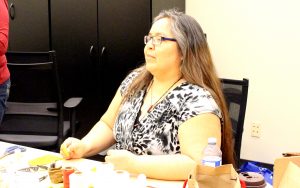
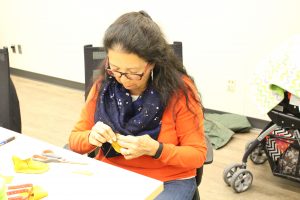
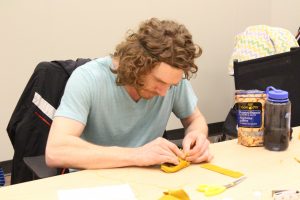
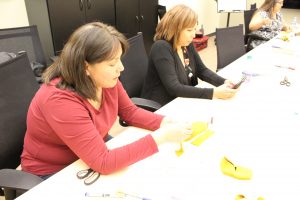
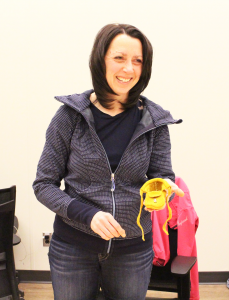
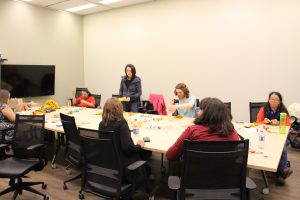
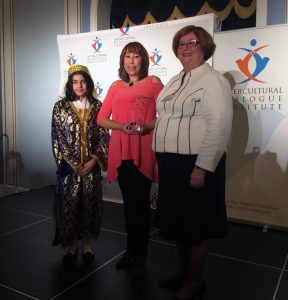
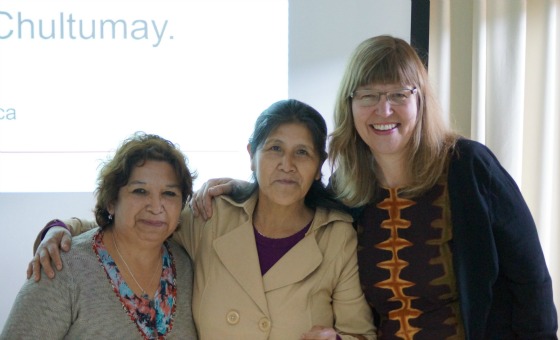


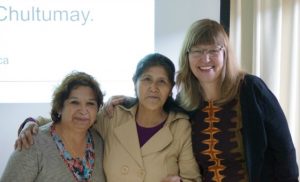
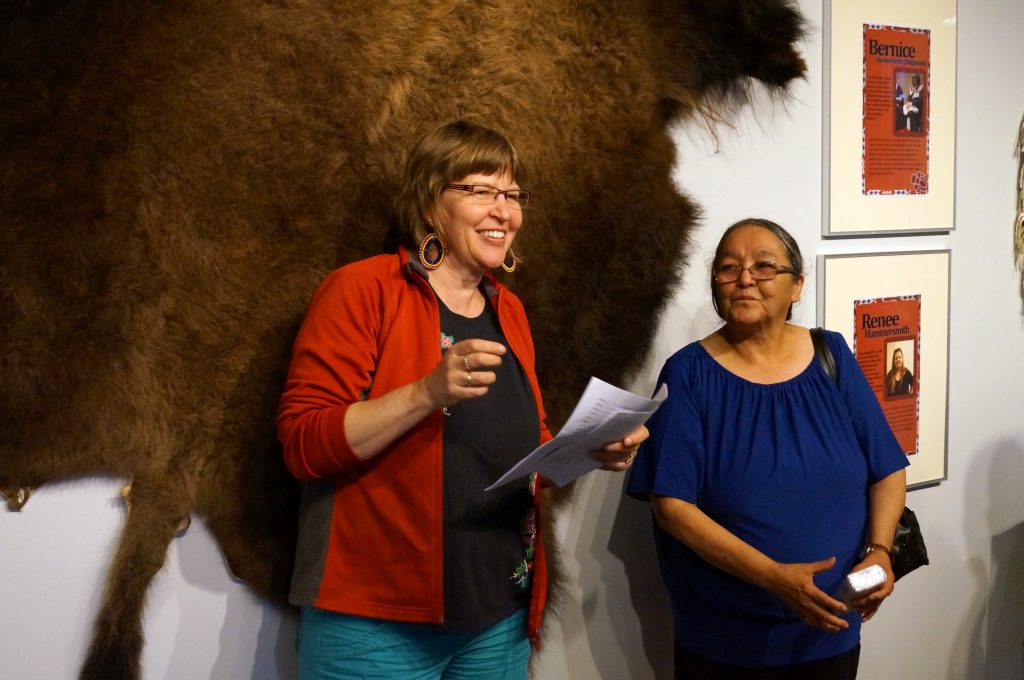
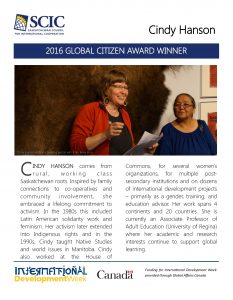
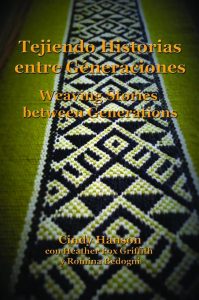 Dr. Hanson’s most recent SSHRC-funded research explores intergenerational learning in Indigenous textile communities of practice in both Canada and Chile. From this work, she has co-authored with Heather Fox Griffith and Romina Bedogni (doctoral candidates), a self-published book entitled,
Dr. Hanson’s most recent SSHRC-funded research explores intergenerational learning in Indigenous textile communities of practice in both Canada and Chile. From this work, she has co-authored with Heather Fox Griffith and Romina Bedogni (doctoral candidates), a self-published book entitled, 